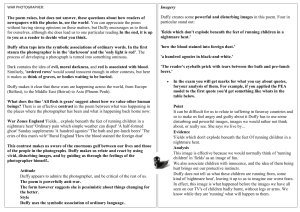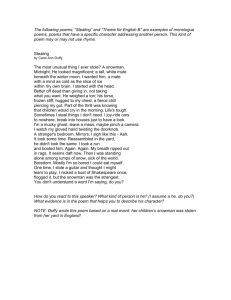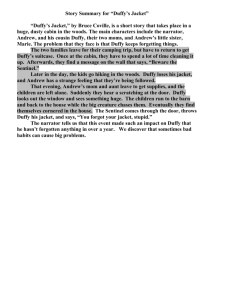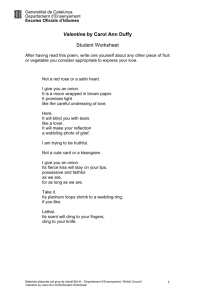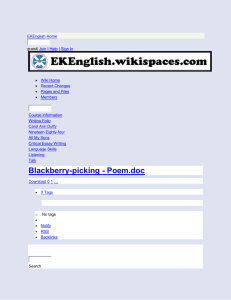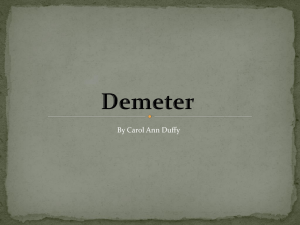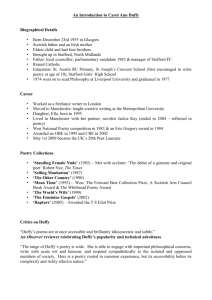BYWM Example essay.doc
advertisement
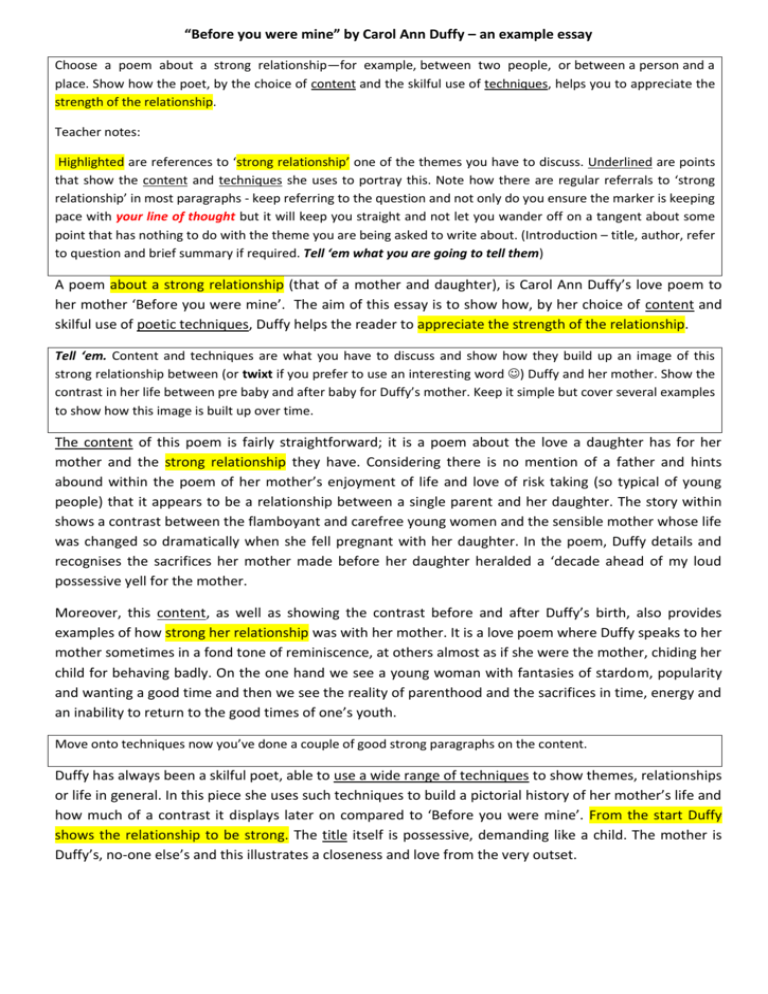
“Before you were mine” by Carol Ann Duffy – an example essay Choose a poem about a strong relationship—for example, between two people, or between a person and a place. Show how the poet, by the choice of content and the skilful use of techniques, helps you to appreciate the strength of the relationship. Teacher notes: Highlighted are references to ‘strong relationship’ one of the themes you have to discuss. Underlined are points that show the content and techniques she uses to portray this. Note how there are regular referrals to ‘strong relationship’ in most paragraphs - keep referring to the question and not only do you ensure the marker is keeping pace with your line of thought but it will keep you straight and not let you wander off on a tangent about some point that has nothing to do with the theme you are being asked to write about. (Introduction – title, author, refer to question and brief summary if required. Tell ‘em what you are going to tell them) A poem about a strong relationship (that of a mother and daughter), is Carol Ann Duffy’s love poem to her mother ‘Before you were mine’. The aim of this essay is to show how, by her choice of content and skilful use of poetic techniques, Duffy helps the reader to appreciate the strength of the relationship. Tell ‘em. Content and techniques are what you have to discuss and show how they build up an image of this strong relationship between (or twixt if you prefer to use an interesting word ) Duffy and her mother. Show the contrast in her life between pre baby and after baby for Duffy’s mother. Keep it simple but cover several examples to show how this image is built up over time. The content of this poem is fairly straightforward; it is a poem about the love a daughter has for her mother and the strong relationship they have. Considering there is no mention of a father and hints abound within the poem of her mother’s enjoyment of life and love of risk taking (so typical of young people) that it appears to be a relationship between a single parent and her daughter. The story within shows a contrast between the flamboyant and carefree young women and the sensible mother whose life was changed so dramatically when she fell pregnant with her daughter. In the poem, Duffy details and recognises the sacrifices her mother made before her daughter heralded a ‘decade ahead of my loud possessive yell for the mother. Moreover, this content, as well as showing the contrast before and after Duffy’s birth, also provides examples of how strong her relationship was with her mother. It is a love poem where Duffy speaks to her mother sometimes in a fond tone of reminiscence, at others almost as if she were the mother, chiding her child for behaving badly. On the one hand we see a young woman with fantasies of stardom, popularity and wanting a good time and then we see the reality of parenthood and the sacrifices in time, energy and an inability to return to the good times of one’s youth. Move onto techniques now you’ve done a couple of good strong paragraphs on the content. Duffy has always been a skilful poet, able to use a wide range of techniques to show themes, relationships or life in general. In this piece she uses such techniques to build a pictorial history of her mother’s life and how much of a contrast it displays later on compared to ‘Before you were mine’. From the start Duffy shows the relationship to be strong. The title itself is possessive, demanding like a child. The mother is Duffy’s, no-one else’s and this illustrates a closeness and love from the very outset. Duffy then sets the scene by building an image of her mother and friends ‘on the corner you laugh on’ wearing ‘polka dot dresses’ which ‘blows round’ (your) ‘legs’. The single word ‘Marilyn’ then appears to serve two purposes. One is to perhaps name the mother, although this seems unlikely. The other more probable purpose is to date the image in the sixties and convey an iconic image similar to Marilyn Monroe in the classic film ‘The Seven Year Itch’ where her dress is blown up by a heating grid in New York. This serves to show that the mother is regarded as beautiful (by her daughter at least) as well as flamboyant and good enough to be a Scottish version of the iconic Monroe. Such a metaphor enhances the relationship between mother and daughter as there is now an element of star worship and adoration and pride as well as love. Another metaphor is when Duffy tells of the place her mother frequents so regularly; ‘the ballroom with a thousand eyes’. In here her mother was watched and admired and she performed in her ‘high heeled red shoes’. Red is symbolic of love but also passion and fire and ironically danger and rebellion. Unfortunately the mother fails to stop and see the danger and falls pregnant, removing her from the ballroom and forcing her to relive her memories of dances such as the ‘Cha cha cha’ which she teaches her daughter on the way home from Mass. There is more symbolism and irony here since Catholics attend Mass and also have a complex theology of rules and standards. On the one hand Duffy’s mother showed obedience to Catholic decrees by not having an abortion (if, as it seems she were unmarried) but on the other she has broken the teachings of her Church that forbids premarital sex. More irony is shown as she teaches her female child a sensual dance on the way home after fulfilling her weekly duty by attending Mass. Throughout the poem Dufy hints at her mother’s bending of society’s unwritten rules of the time. She implies her mother should have taken ‘the right walk home’ rather than the wrong one and insinuates her willingness to engage in heavy petting and so on as she asks her own mother about ‘small bites on your neck, sweetheart?’ This role reversal within the rhetorical question again shows this is/was a strong relationship; strong enough to allow the child to chide the mother in a loving way. The positive vocabulary throughout also builds up a positive image of a vibrant, happy young woman who is determined to ensure she is always there for her daughter and the daughter adores her in return. As Duffy says ‘love lasts’ and this alliterative phrase shows the depth of her love. Despite the lack of freedom or the death of her own dreams, Duffy’s mother encourages her daughter to be herself and tries to bring her up as best she can. She has a sense of duty to her child and raises her as a good dutiful Catholic but with a rebellious streak that they both share and enjoy. Tell ‘em what you’ve told ‘em. Round off. Summarise your main points about content and techniques being used to build an image of a strong relationship which you appreciate. Give a personal response. By the use of these techniques which portray strong images of a happy and mutually supportive relationship and the content that shows the contrasting lives of mother and daughter, Duffy has shown the reader a strong relationship which they can empathise with. This poem makes readers such as myself think and hopefully understand that it is this strength of the bond between Duffy and her mother that enables Duffy herself to appreciate life and convey her viewpoints to us so successfully in her work. Words: 1020

